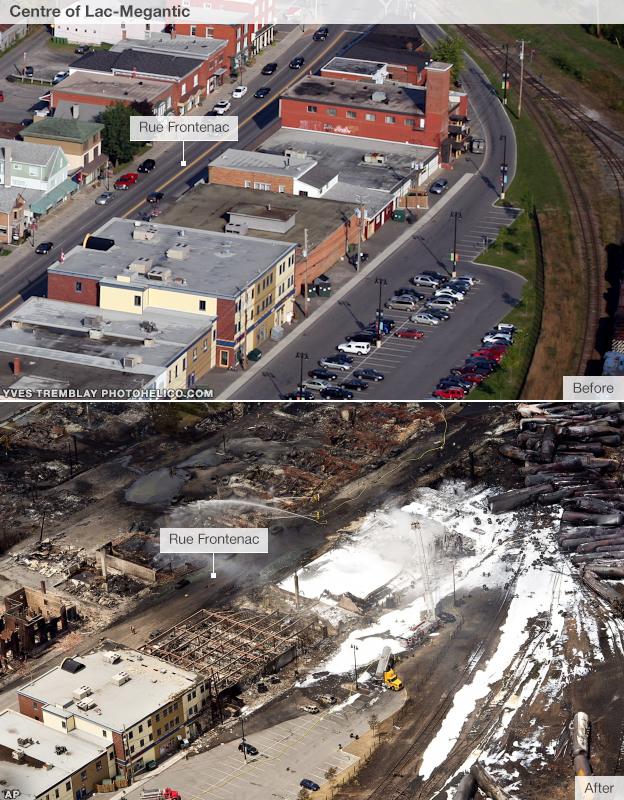Sixty dead or missing after Lac-Megantic train blast
- Published
Lac-Megantic resident Adrien Aubert filmed the aftermath of the blast
Sixty people are now thought to be dead or missing after a freight train carrying crude oil derailed and blew up in Quebec, Canadian police say.
Earlier, 50 people were unaccounted for after Saturday's blast in Lac-Megantic. There are 15 unidentified bodies.
Authorities have launched a criminal investigation into what happened, but they have ruled out terrorism.
The boss of the train's US owner is due later to visit the scene, a day after he admitted "partial responsibility".
At least 30 buildings were razed by the fireball from the explosion that rocked the town on Saturday morning.
'Enormous task'
But the entire town centre is being treated as a crime scene, with several additional streets cordoned off by police tape.
Quebec Police Inspector Michel Forget said that while investigators had ruled out terrorism as a motive for the attack, several other options - including criminal negligence - remained under consideration.
"This is an enormous task ahead of us," the police inspector said. "We're not at the stage of arrests."
Some 200 officers were still conducting searches on Wednesday morning.
But police said the effort was taking a toll on some crew members and two people had to be taken off the operation over worries for their physical condition.
"This is a very risky environment," said Quebec Provincial Police Sgt Benoit Richard.
"We have to secure the safety of those working there. We have some hotspots on the scene. There is some gas."
Bodies incinerated?
Authorities have asked the relatives of those still missing to provide DNA samples by bringing in toothbrushes, razors and other items.
Edward Burkhardt: "Our operation is entirely consistent within industry standards and our safety records are pretty good"
But the authorities have also warned some of the bodies may have been burnt to ashes in the explosion.
The train, carrying 72 cars of crude oil, was parked shortly before midnight on Friday in the town of Nantes about seven miles (11km) away.
Local firefighters were later called to put out a fire on the train.
While tackling that blaze, they shut down a locomotive that an engineer had left running to keep the brakes engaged.
Shortly afterwards the train began moving downhill in an 18-minute journey, gathering speed until it derailed in Lac-Megantic and exploded.
The fire department and the train's owners have appeared to point the finger at one another over the disaster.
Rail World chief executive Edward Burkhardt suggested on Tuesday evening that firefighters shared some blame.
"We don't have total responsibility, but we have partial responsibility," he told reporters in Montreal.
Earlier this week he told the media he had received hate messages.
The train was carrying oil from the Bakken oil region in the US state of North Dakota to a refinery on the east coast of Canada.

- Published10 July 2013
- Published10 July 2013
- Published7 July 2013
- Published7 July 2013
- Published7 July 2013